I think it is a water well pump.
Yes Victorsmate, that makes complete sense. This seems to mean that the old lady had to go out of her house to draw water into a kettle, a saucepan or a basin every time she wanted some water. George Belcher is really looking at life as lived by people who weren’t rich.
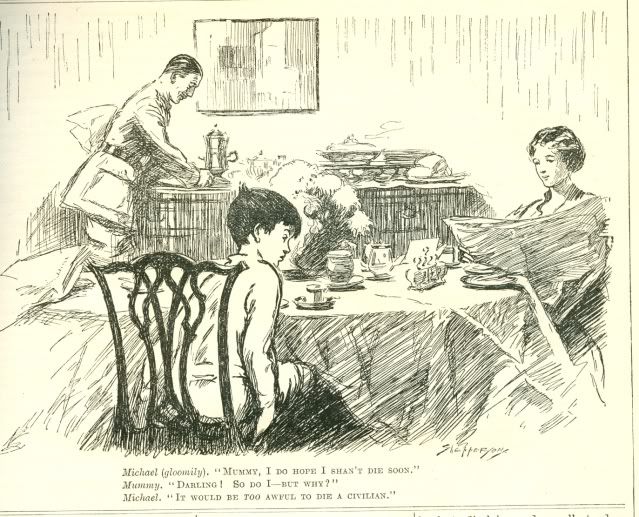
1914: A Boy’s Idea of Identity
The war had gripped the national psyche so thoroughly that Michael can only think of one acceptable future for him which is that of being a soldier. Anything else would mean abject failure.
On the plus side from our vantage point we can see that he would still be too young by the time that the Great War had ended. Far ahead by 1939 he would still be eligible for military service but, fortunately for him, his age would ensure that his role would by then be well away from the actual fighting.
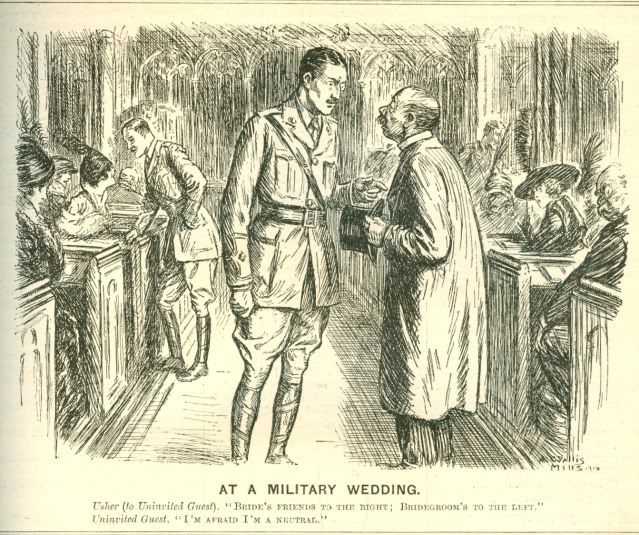
1914: The War Enters Almost Every Conversation
The caption tells us that we are observing the congregation at a military wedding. What it doesn’t mention is that it is an extremely smart wedding. The ladies are ‘dressed to the nines’. The two soldiers in the centre of the picture are cavalry officers, quite possibly in the Household Cavalry. Their uniforms allow them to be dressed ready to mount their horses after the ceremony though this is certainly not going to happen.
The uninvited guest describes his status in terms of the war itself. (His reply reminds me of another Punch cartoon from the 1920s in which an aged curmudgeon arrives at a wedding and is asked whether he is a friend of the bride or the groom. He replies ‘I detest them both intensely.’)
So why did the man in the centre of today’s cartoon actually attend the wedding – apart, that is, from providing an excuse for the joke? Perhaps he considers it his duty to attend the wedding of a fellow officer.
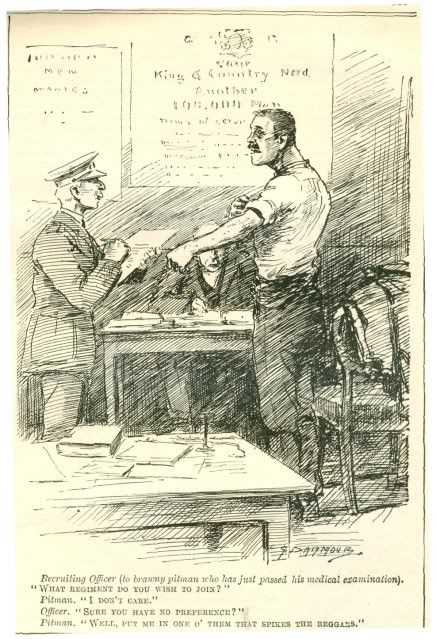
1914: From Down the Mines to Life in the Trenches
The drawing emphasises the physical strength of the pitman by contrasting him with the puny little Medical Officer. Having survived working down the mine, the pitman will certainly be able to cope with the privations of the trenches. His enthusiasm is typical of that time early in the war.
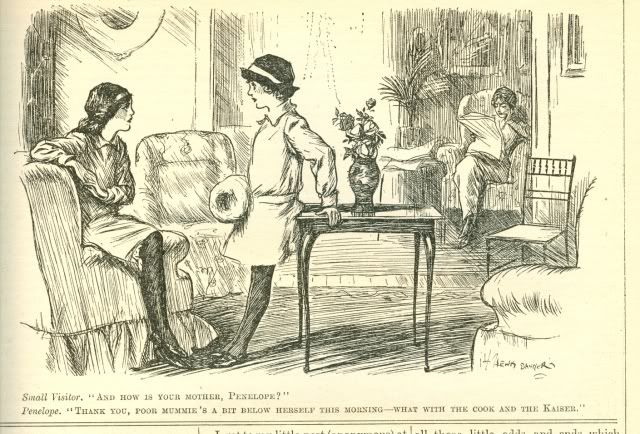
1914: Which is the Greater Menace?
Penelope is well aware of the tension in the family. Mummy is up against ‘the servant problem.’ Now, as well as having to win her daily tussle with the contrary cook, she has to cope with the effects of the war as they impinge on the household of which she is in nominal charge. We see her at the back of the picture trying to relax with the newspaper but the position of her left hand reveals that she feels anything but relaxed.
We note that the young visitor doesn’t wear gloves to keep her hands warm. Instead, she carries a muff. Here is the Wikipedia definition:
A muff is a fashion accessory for outdoors usually made of a cylinder of fur or fabric with both ends open for keeping the hands warm. It was introduced to women’s fashion in the 16th century and was popular with both men and women in the 17th and 18th centuries. By the early 20th century, muffs were used in England only by women. It is also reported that the fashion largely fell out of style in the 19th century. It briefly returned in the late 1940s and 50s.
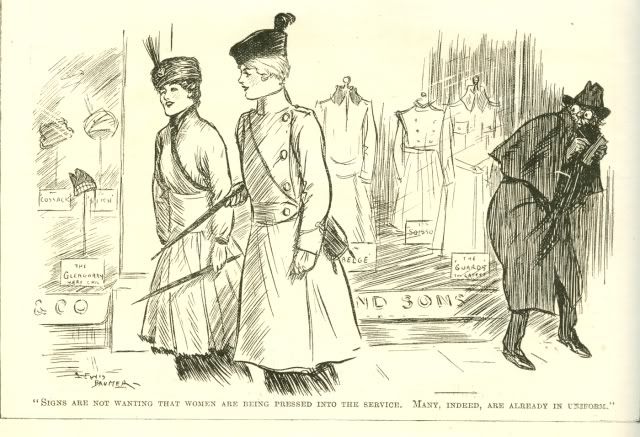
1914: Another Inept Spy
Here is a further example of the spy mania that was sweeping the country. The joke here is that the spy has misunderstood the recent trend in ladies’ fashion which was influenced by military uniforms. He imagines that the women that he sees thus attired are actually in the military.
The spy is portrayed as some kind of bogeyman obviously up to no good. He is writing his report out in the open. A real spy would not be so blatant.
Later on in the war some opening were made for women to serve in an auxiliary capacity though their uniforms were by no means so smart. In the Second World War the German war effort was handicapped by the Nazi ideological insistence that women should stay at home. During that conflict there were many opportunities in Britain for women to participate more actively in the war effort.
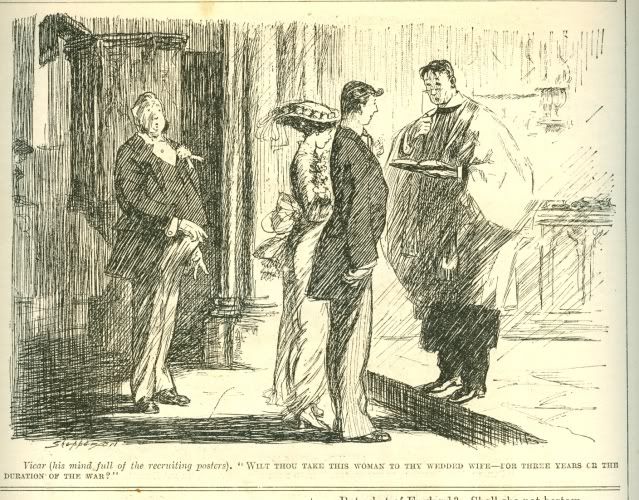
1914: Clerical Error
Would the clergyman really confuse the traditional ‘till death do you part’ with the length of military service? It’s just another joke about the way that the war has crept into all aspects of daily life.
It reminds me of an academic joke. A Cambridge lecturer in theology also doubles up as a parish priest. In a church service after the Ten Commandments have been read the Rector commences his sermon by saying, “Candidates are advised only to attempt four of these.”
This drawing has some nice touches. The gentleman on the left (the father of the bride?) looks suitably shocked. The clergyman is reading with a lorgnette, which is something we don’t see these days. I suspect that they always had an aristocratic aura about them and that is probably why the cartoonist has shown it. The bride and groom are shown as suitably young and inexperienced. I wonder if that upwardly mobile lock of the bridegroom’s hair was fashionable at the time.
Going back a cartoon or three, ‘that contraption’ is a water pump
Britain was still quite old-fashioned till after WW2. My father was a builder in rural Warwickshire during the 1950s & 60s. A lot of his work was installing piped water into houses, farms & cottages; plus the drainage.
This was to replace a water pump at the end of a small row of cottages, or in a shared courtyard.
Some of the villages & hamlets were being connected to mains water, electricity & a decent sewage system for the first time. The local agricultural market would have a ‘general sale’ once a month, a sort of early car boot sale.
If a village had just been connected there would be a glut of jug & bowl sets or paraffin lamps
A friend’s older brother worked for the Midlands Electricity Board as a junior surveyor. Part of his job was to go out with the team to the local villages to survey for the future electricity supply
Hello zuludog
Thank you for your interesting post. You remind me of something that I experienced a long time ago. It was in 1940 (much nearer in time to 1914 than now). I was living in a house in rural Buckinghamshire. There was a water pump just for that house and the pump was indoors. Thinking back it must have been used for keeping the cold water tank full. So all that needed to be done was to move a handle forward and backwards. You didn’t actually see the water that was being pumped. It was the kind of job that a child could do and indeed it was a chore that I performed many times.
1914: The Christmas Truce
As I reach the end of the 1914 cartoons I want to mention the extraordinary events on the Western Front in the week leading up to Christmas Day when there were many spontaneous occasions when the fighting ceased and there was fraternisation in No Man’s Land. The men who had been trying to kill each other and who would soon resume their lethal intent were able to enjoy this temporary respite from the slaughter. They showed each other photographs of their families and exchanged cigarettes and food. There were impromptu football matches.
I do not have any Punch cartoon concerned with this unusual event. Perhaps it was too difficult to decide what line to take; this story doesn’t chime well with that intense hatred of all things German. The generals on both sides were appalled and in 1915 very explicit instructions were handed down forbidding any repetition. It is clear from reminiscences of the time that the men at the front found that they had much more in common with their immediate opponents than they had with the politicians who had sent them there or with the brass hats who commanded them from well behind the lines.
Thanks to Google I have found a sympathetic account in what may well have been the then ubiquitous Illustrated London News. (I think that the LIFE logo on the bottom right hand corner is there for modern copyright reasons.) So they knew about it back home. I assume that there must have been two photographers present so that the man in the centre with his (very large) box camera could be shown in action. That second photographer would have been British. The German photographer could hardly have sent the developed picture to his temporary friends in the post.
Having said that I feel that there is something stage-managed about the picture. I am not suggesting that it is faked but it certainly is not spontaneous. These men don’t look as though they have just climbed out of a muddy trench into No Man’s Land. Their uniforms look more appropriate to the parade ground rather then the trenches.
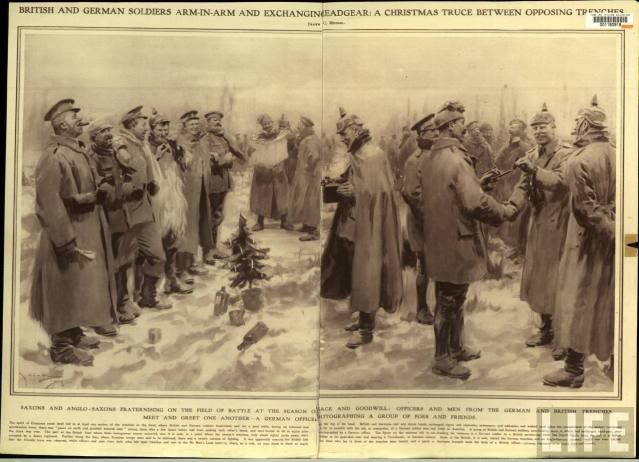
We will now take a rest from World War One and go forward to 1949. Personally I remember it quite well. That was the year in which I left my grammar school and embarked on a three year degree course in History.
By then the preponderance of upper middle class situations in Punch has lessened in spite of some notable survivals. Some World War Two egalitarianism has crept in and the number of people who had enjoyed that life style had clearly diminished.
By 1949 post war rationing, shortages and a general mood of austerity were still very much the order of the day. While trying to hold on to past grandeur a slow realisation was growing that imperial greatness was now a thing of the past.
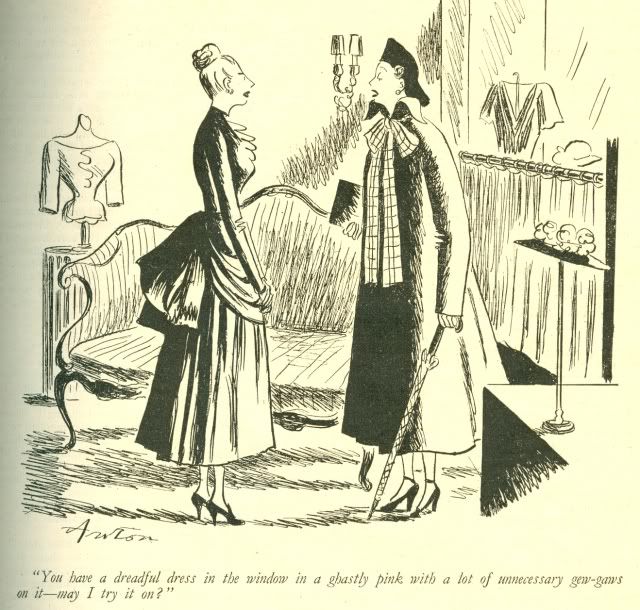
1949: Wanting What You Ought Not to Want
The artist here uses the pseudonym of ‘Anton’ which was a disguise for a woman who called herself ‘Antoinette’ although that wasn’t her real name. Her output appeared frequently in Punch at this time and her work often gave an interesting insight into the time.
The drawing here is a fine Anton example and to understand it one has to think back to the time in which it appeared. The customer is criticising the dress in the window because it is counter to the current mood of austerity. The country is suffering from a severe balance of payments problem and the population at large is being exhorted to a life of austerity. My interpretation of the cartoon is that the customer fully understands and is really in sympathy with what the government is telling her. But…
But…
But she wants the dress because it is ‘made in a ghastly shade of pink with a lot of unnecessary gewgaws on it’. She wants a break from austerity. Her dilemma makes no sense in today’s consumerist society but back in 1949 this was a genuine moral issue.
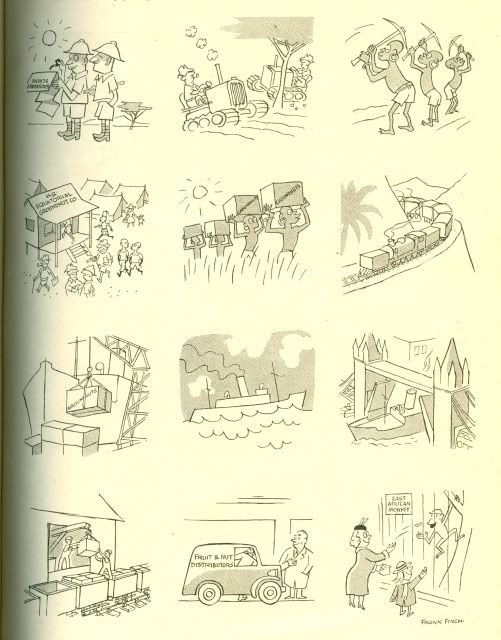
1949: A Governmental White Elephant
This cartoon is a political satire (though parts of it are not all politically correct.) The Attlee Government had launched the Ground Nut Scheme as a way of harnessing the then British colony of Tanganyika to aid the British economy. As the cartoon correctly predicted it was a monumental failure.
This was not the only occasion when a government thought it could play a leading part in economic development. This way of thinking had probably been influenced by the recent war when huge enterprises were masterminded by the appropriate government department. (An extreme version of this is called a centrally controlled command economy.) This belief continued right until Mrs Thatcher decreed that governments were not suited to make wise commercial judgements. Command economies are right out of fashion today.
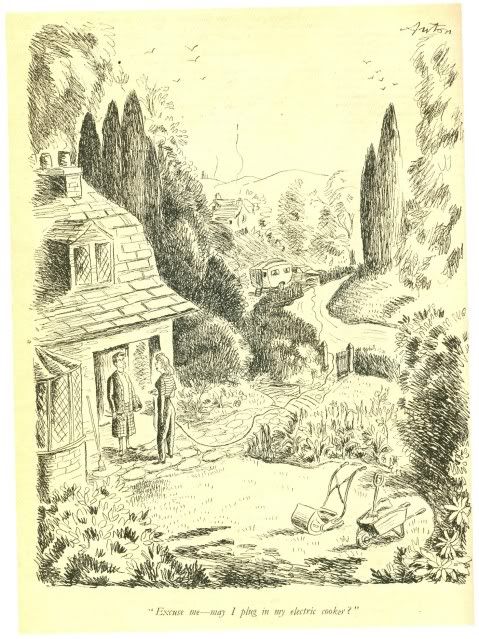
1949: Trailer Woman
Detailed drawings such as this are much rarer in 1949. The meaning here seems clear enough. The caller is taking a liberty when she expects to be allowed to plug her electric cooker into a nearby house. Note that she has brought the plug with her. She hasn’t broached the subject first before bringing the plug at the end of its long lead nor has she offered any financial recompense.
However, I suspect that there is more to the cartoon than just that. I think that there is an agenda of class at work here. The woman in tweeds being visited has surely come down in the world but is nevertheless maintaining standards. There are plenty of signs of gardening activity but there is no hint of a gardener being employed. The gaunt woman is doing it all herself: digging, mowing, pruning and all the rest.
The woman holding the plug is not looking gaunt. I guess that we are meant to recognise that she has come somewhat up in the world, though she has not been taught the rudiments of common courtesy. Why do I think that she is upwardly mobile? It’s the car and the trailer. Car ownership was very limited in 1949.
The gardening lady (and the readers of Punch) will have felt that the world had gone topsy turvy.
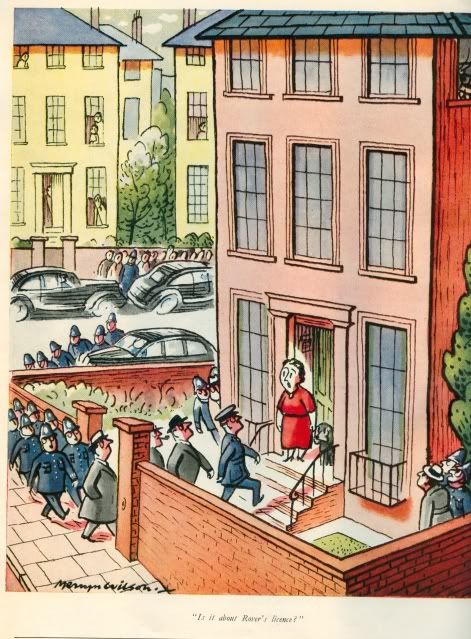
1949: Police Raid
This is what a serious police raid would have looked like in 1949. It is a very old joke indeed that Rover’s mistress should assume that the very full force of the law is descending on her because the dog licence is not up to date.
Clearly that can’t be the reason. Possibly they have come to the wrong address. We hear of examples of this sort of thing nowadays. Perhaps it is not a new thing.
The alternative explanation is that the lady has no idea of what her husband has been getting up to. It might have been serious crime. The other possibility is that with the Cold War ’hotting up’ he has been giving away state secrets to the Russians. That would certainly have got the Met going into overdrive.
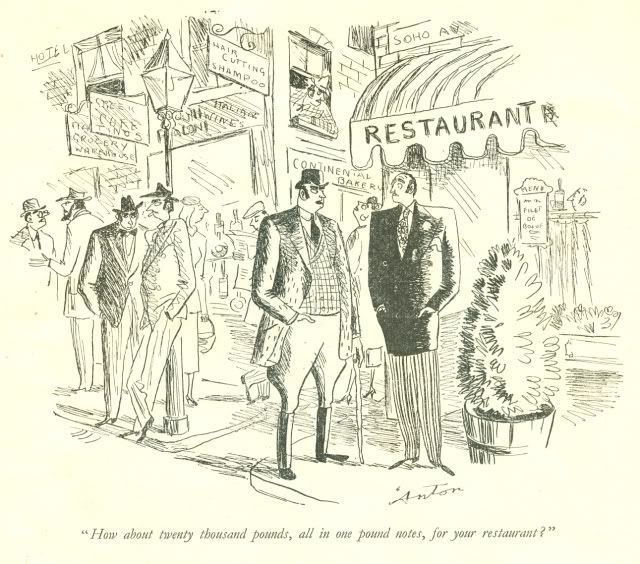
1949: The Black Economy
It is quite a challenge to understand this cartoon. Anton has not thought it necessary to provide an explanation but what must have been obvious in 1949 may well elude us today. I have found all her other cartoons very easy to understand.
There is no doubt that the scene is set in Soho as it then was. It was clearly a place for spivs, foreign food, foreign shops and foreign people. This set Soho apart from the rest of the country. Multiculturalism had definitely not yet arrived in the country at large.
Three of the men look to me like spivs, with their shifty looks, pencil moustaches and squashed hats. On the left we see some foreign-looking types. Now we come to the characters at the front of the picture. The man on the right is clearly the proprietor of the French restaurant and he is himself also French.
Now what about the man who is making the dodgy proposition? Twenty thousand pounds was, for all I know, a realistic offer. But the one pound notes alert us to the fact that something fishy is going on here. However the man making the offer is surely neither foreign nor a spiv. My guess is that he is supposed to be a gentleman farmer.
I suggest that the farmer has made very substantial profits from black market deals. Alan Bennet has caught the atmosphere of strict food regulation in the film called A Private Function. The farmer dare not pay his illicit income into a bank account for fear of arousing the Ministry of Food Inspector’s suspicions. So he proposes to pay ready cash for the restaurant which then becomes a legitimate business interest. That is what today is called money laundering.
So, what exactly is the point of the joke? I think that it is irony. How ironic it is to think that while the spivs are just petty criminals and who knows if the foreigners on the left are doing anything illegal or not but it is the ‘fine upstanding British’ gentleman farmer who is the major criminal.
I am far from sure that I’ve got it right. Has anybody got any other, more convincing explanations?
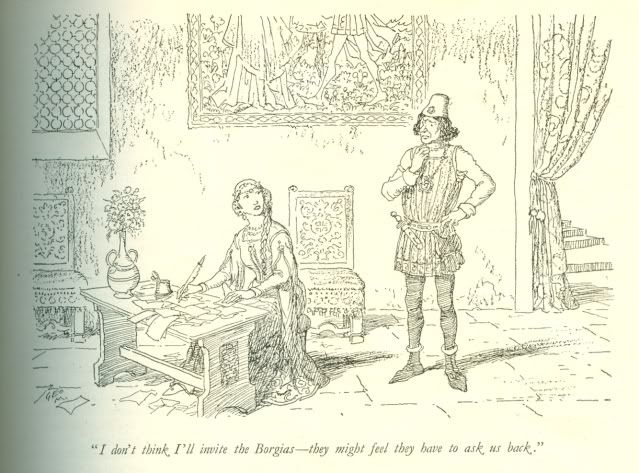
1500 A Wise Decision
This cartoonist specialises in drawings in which modern activities are transported into historical or mythological situations. Readers of Punch could give themselves a pat on the back as they recognised the allusions.
This particular drawing evokes a time of renaissance style and drama which might well have attracted people suffering from the drab uniformity of life in the post-war 1940s.
The best yet Mr M.

1949: Prison Breakout Attempt
At first sight this looks like a straightforward joke in which the suave Governor is gently chiding the prisoner whose escape plan has gone spectacularly wrong. The Governor looks like of a man of authority in the late 1940s with his fashionable suit and his bushy moustache.
However I think that Anton had some fun here and is challenging us to spot some deliberate mistakes. Here are my suggestions:
By looking though the office window I see that it is situated upstairs in the prison. This means that Rogers has tried to escape from the prison by attacking a ceiling with his pickaxe. No prisoner would be that stupid.
Prisoners had ceased to wear the upward arrow uniform by 1922.
It is entirely appropriate that the Governor would have kept by him the relevant regulations under which he had to work. These would no doubt include a copy of the Prisons Act and various relevant Home Office publications (in addition to the single page Prison Rules attached to the wall). None would be called ‘Crime & Punishment’ whether or not written by Dostoevsky.
The keys on his desk look out of place. Surely the Chief Warder would keep them?
I also wonder why the Governor would be perusing notices about rewards for the apprehension of wanted criminals.
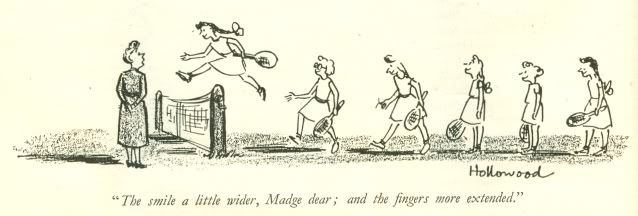
1949: It’s on the Curriculum
I may be wrong but I am under the impression that it is the losing competitor who is expected to leap over the net in order to congratulate the winner. The fixed grins and outstretched hands are thus part of the training for being good losers.
Such pessimism as early as 1949!
